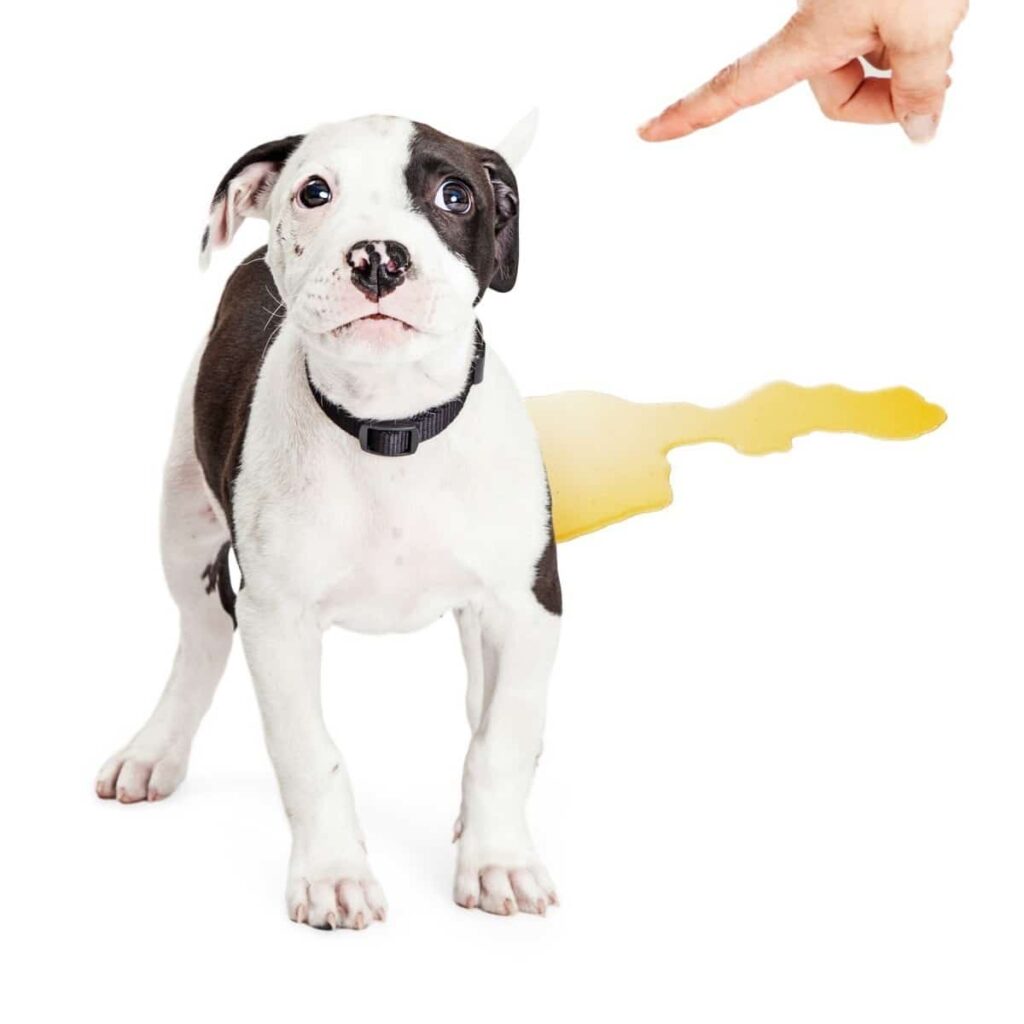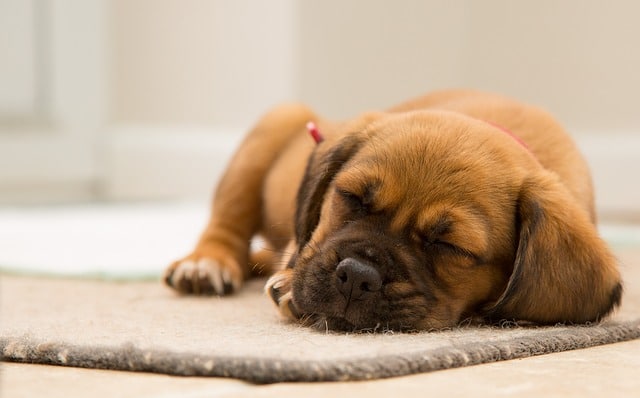It is every dog owner’s wish to spend most of their time with their dogs.
However, this is not possible because you have to leave the house for work and other responsibilities.
This simply means that you’ll have to leave your puppy alone for a few hours and crating is one of the best ways of keeping your puppy safe while you are away.
There are also instances when you may need to contain your puppy inside a crate to train him to sleep in it or eliminate in the right spots.
Apparently, there are several reasons why a dog owner may choose to put a puppy in a crate.
Whatever your reason for crating your puppy is, you shouldn’t contain him inside the crate for a whole day.
So, the million-dollar question is: how long can you leave a puppy in a crate?
Well, there is no hard and fast rule about the length of time that you should crate your puppy.
There are a number of factors that come into play, including:
1. Age

The age of your puppy is one of the most important factors that should give you an idea of how long you should leave your puppy in a crate.
The number of hours you should leave a 10 weeks puppy in a crate is different from a 17 weeks puppy.
Assuming that your puppy is properly housetrained and getting the right amount of care and exercise, a general rule of the thumb is to take the number of months in his age and add one.
A four-month-old puppy, for instance, should be left in a crate for up to five hours (4+1=5 hours max.).
Based on this, here is a guideline you can always refer to:
- 30-60 minutes for 9-10 Weeks old puppies
- 1-3 hours for 11-14 Weeks old puppies
- 3-4 hours for 15-16 Weeks old puppies
- 4 hours+ for 17+ Weeks old and older puppies
Bottom line: A puppy should not be left in a crate for more than 5 hours without a good break.
2. How Long Can Your Puppy Hold It?

Dogs are different. Some puppies may hold their bladder better at 12 weeks than others.
So, how long your puppy can hold his bladder is another important factor to consider when you are trying to figure out the number of hours that you can leave your puppy in a crate.
Apparently, young pups (below 12 weeks) cannot control or hold their bladder—no matter the type of dog he is. So, when they feel the urge to ‘do their business’, they will do it.
However, as they age, they will learn to control it better. Some breeds will also start to understand the right spots to eliminate.
So, besides age, consider how your individual puppy can hold or control his bladder.
Nonetheless, always remember to use the above guide on the ager and ideal hours of leaving your puppy in crate-no matter how perfect he can hold his bladder.
3. Crating at night
Like humans, our pup’s bodies tend to slow down at night than by the day.
So, if your puppy can hold his bladder (at 12+ weeks), you can leave him in a crate all night long without any issue.
Puppies of between 8 and 12 weeks and/or below cannot control their bladders, so you need to take them out during the night to potty.
This could be as often as every 2-3 hours for young puppies, so ensure that you set up your alarm accordingly.
Related Post: How Long Can a Small Dog Hold Its Bladder Overnight?
4. Other Factors
Besides the above factors, your puppy’s medical condition/history, personality, or temperament should also determine how long you can leave him in a crate.
If your fur baby is sick and can’t hold it in, for instance, the crating duration should go down.
Some medical conditions may also mean that your puppy has to go to the bathroom as frequently as possible.
In such cases, leaving your puppy even for more than one hour is not recommended.
Some breeds also don’t like to be left alone for long, and may not do well with longer crate time.
Related Posts:
Midday Break is Important
While some puppies can stay in a crate for longer than others, it is not realistic to expect them to hold their bowels for long every day. You need to give them midday potty breaks or frequent potty breaks if possible.
If you are going to be out the whole day (if you are working, for instance), you may need to hire a pet sitter or ask a friend to drop by your house to help you take your puppy out.
Without potty breaks, you could be teaching your pup to soil his crate or even expose him to more problems (see below).
Potential Problems with Overcrating a Puppy

Leaving your puppy for more than five hours a day in a crate without any potty break is not ideal.
Once or twice a week may not harm him. However, leaving him every day is likely to have an impact on his behavior and health:
- A lot of time in the crate translates to less socializing time with people and other pets. As a result, your puppy may become less affectionate, easily stressed out, and respond poorly to training.
- Your puppy may become restless during the evening. He may pace, whine, or manifest excessive amounts of energy when he is supposed to be tired and winding down.
- A puppy may also suffer from separation anxiety. When your puppy is left unattended for several hours, he will begin to get worried and distressed. Even if he doesn’t suffer from severe separation anxiety, he will still feel distressed if left alone for over 5 hours in a crate.
Related Post: 8 Heavy Duty Dog Crates for Separation Anxiety
- Your puppy is likely to have an accident in the crate. Even worse, he may develop rashes or infections like urinary tract infections.
- Crating your puppy for long means that he will not be able to stretch around or move sufficiently. This can cause pain, discomfort, and even health conditions like hip dysplasia.
Related Post: 12 Best Joint Supplements for Dogs with Hip Dysplasia
- Lack of physical mobility could also cause other issues like loss of muscle mass, weight gain, and underdevelopment in puppies.
Other Important Considerations

The crate time guidelines we’ve discussed so far don’t apply to all puppies. Some puppies need more attention and less crate time than others.
And others don’t handle crates well, so no matter the amount of time you try to leave them in a crate, they will get anxious.
Irrespective of the amount of time you plan to leave your dog in a crate, therefore, strive to make the crate as comfortable as possible to your puppy.
- Always take your puppy to the bathroom before crating him for any length of time. Remember to also take him to the bathroom immediately you let him out of the crate because he will be ready to go.
- Consider exercising your puppy before leaving him in a crate for any length of time. A tired puppy is always willing to relax and chill out. If he is full energy, leaving him in a crate even for 20 minutes will simply drive him mad.
- Leave a few teething toys for your puppy so that there is something for him to do while you are away. This will not only minimize boredom but also teach him the good habit of chewing on appropriate items.
Related Post: Top 10 Freezable Teething Toys for Puppies
- If you realize that your puppy starts to panic once contained in a crate or if he has severe separation anxiety, consider keeping him in a puppy-proofed area or room instead of a crate. You can invest in a treat dispenser or feeder with a camera to check his progress during the day.
Final Thoughts
You can’t be with your puppy all the time, so if he is happy and healthy, crating him while you are away is an excellent way of keeping him safe. Some puppies even like their crates due to the privacy and coziness that they bring.
That said, some puppies can stay in a crate for longer than others.
Age, bladder control, personality, energy levels, and medical history/condition also play a critical role.
So, it is always important not to leave your puppy for longer than necessary as this may cause a lot of harm in the long run.
Use the guidelines we have highlighted in this guide and always remember your puppy’s individual needs to come up with a schedule that works for both of you.
Related Posts:
When Should You Move Puppy Crate Out of Bedroom?
How To Potty Train a Puppy to Go Outside in 7 Easy Steps
How To Potty Train a Puppy on Pads
12 Easiest Small Dogs to Potty Train
As an Amazon Associate, we may receive a small commission from qualifying purchases but at no extra cost to you. Learn more. Amazon and the Amazon logo are trademarks of Amazon.com, Inc, or its affiliates.

